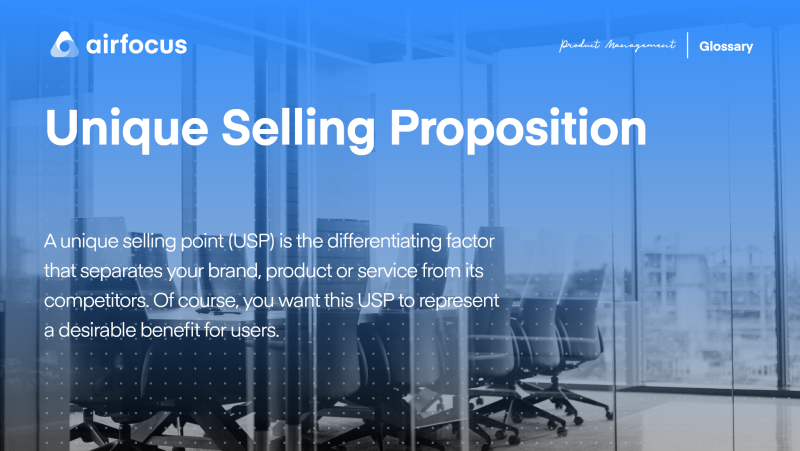Unique Selling Proposition (USP)
What is a unique selling proposition (USP)?
Definition of unique selling proposition
A unique selling proposition (USP) is the differentiating factor that separates your brand, product, or service from its competitors. Of course, you want this USP to represent a desirable benefit for users.
Great USPs will recognize and celebrate an own-able feature, advantage, or benefit that other players in your industry cannot claim. It will also be specific, veering away from generic generalizations such as "the best…".
You may also hear a USP referred to as a "unique selling point".
The benefits of a unique selling proposition
USPs are the basis of all marketing campaigns but are also a source of inspiration for designing and developing new products or features.
However, a unique selling proposition is not to be confused with your product vision.
Where a product vision helps set an internal agenda, it is rarely communicated externally to customers. A unique selling point, on the other hand, is crafted to persuade, engage, and win consumers. It is championed through all branded communication.
When done right, a USP explains to customers why they should buy your brand, product, or service and forgo any other options in that space. It becomes the common thread that runs through everything your brand, product, or service does and says — it is a constant, reinforced message and, as such, USP shouldn’t change with yearly marketing tactics or growth plans. That’s why the strongest USPs stand the test of time.
Crucially, a USP communicates in an emotive way.
Remember: "Benefits sell. Features don’t". So if your differentiating factor is a functional one — e.g. processing speed, free returns — then you should rise above the detail and hone in on an emotional hook for your consumers.
What’s more, unique selling propositions carry great value internally too.
Within an organization, a USP can act as a "north star" for growth and development. If anything in the pipeline fails to support — or worse, goes against — your USP, then it shouldn’t get to market.
In this way, your unique selling proposition gives the sales team a purpose to rally behind and reminds the whole organization what the bigger ambition is when it comes to providing value to users.
As a unique selling proposition is so important to get right, many businesses will choose to work with a specialist agency to hone in on a USP that will be most influential for the target market.
Examples of a unique selling proposition
Uber: the smartest way to get around
Uber’s unique selling proposition truly hits the nail on the head — by digitally connecting passengers with nearby drivers, Uber’s product revolutionized taxi services, making the whole process from start to finish smarter.
Most importantly, this USP doesn’t focus on the how — cashless digital payments, real-time car tracking — but the why. If you want to get from A to B, fastest and smartest, Uber delivers that for you.
Even now, when other car-sharing services enter the market, Uber will have cornered the "smart" proposition thanks to its first-mover advantage.
Slack: be more productive and less busy
Slack has streamlined teamwork. Thanks to multiple integrations, the simple-to-use desktop, and mobile app, and individual and group chat features, it’s now the go-to place for project updates and communication.
This is all summed up in Slack’s core USP message of "be less busy". Again, this hints at greater productivity in an emotive way — it’s not about how much you can do with Slack, but now much freer they’ll feel as a result.
How to write your own unique selling proposition
In order to write your own unique selling point, you’ll need to take a step back and — to a certain extent — forget what you think you know about your brand, product, or service.
You can refer back to your product vision and mission statement, as a reminder of the value you want to provide for your customers. Primary user research can also help you get to the crux of what customers appreciate about your brand, product, or service.
From there, you can begin to draft up your USP by answering the following questions:
Who are we targeting?
What customer problem does our brand, product, or service solve?
What do we do that’s better than any other players in this space?
Is there anything we do that our competitors don’t, or can’t, claim to do?
Why should our customers care about these differences — what’s in it for them?
What is the emotional hook behind our functional benefits or features?
Once you have answered these questions, the secret lies in distilling your message down to one sentence. Try to say too much and you’ll end up saying nothing at all.
Finally, you should ask yourself: how future-proofed is your unique selling proposition? What will new market entrants do to try and take your share? To what extent will your unique selling proposition protect you into the future?
Ideally, your USP should recognize a differentiating factor that is long-lasting.
Who created the unique selling proposition?
The concept of a USP was first explored by Rosser Reeves, an American advertising executive in the 1940s. Reeves was known for incredibly single-minded advertising campaigns, which honed in on one key message.
Reeves’ idea helped inspire the advertising revolution of the early 60s. At this time, ad executives began selling in campaigns based around emotion — not just selling in desirable features, as was typically the more standard approach in previous years.
Today, the unique selling proposition is an invaluable strategic tool, used by marketers and designers to engage and persuade consumers, and ensure continued added value.

General FAQ

Glossary categories
Experience the new way of doing product management

Experience the new way of doing product management








